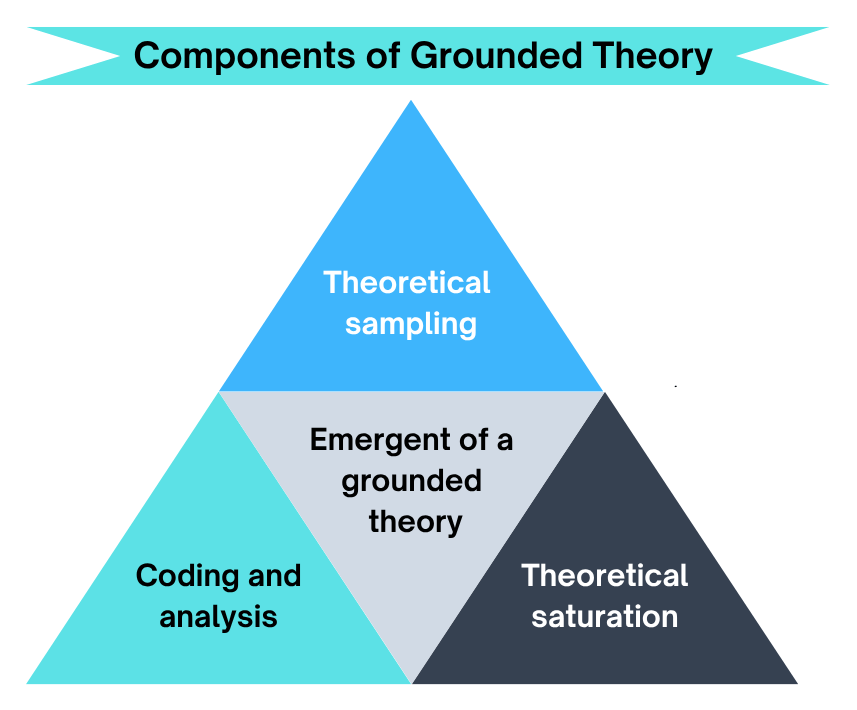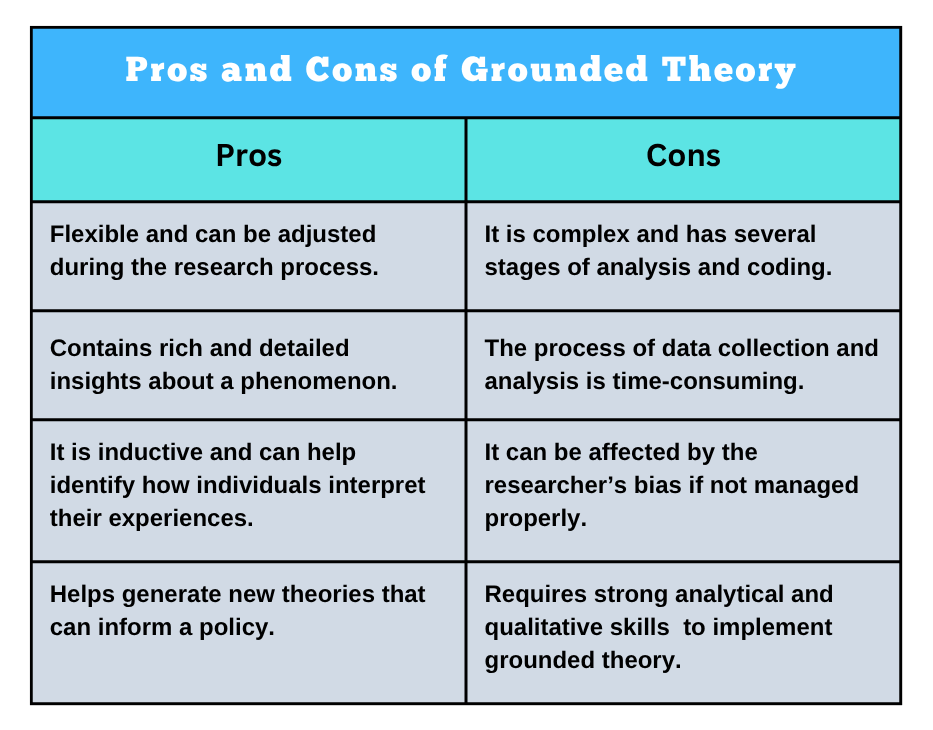Grounded Theory Research: A Guide
Grounded theory is a systematic qualitative research method that is used to generate a theory. The grounded theory research process generally encompasses stating assumptions about the research problem, data collection and analysis, interpretation, and developing middle-range theories based on the findings. Searching for where to get help with grounded theory research? Our professional data analysts are available around the clock to assist with formulating and writing grounded theory qualitative research. This article provides an in-depth exploration of grounded theory research, illustrating its major types, core features, step-by-step procedures, and the quality criteria required to draw accurate and meaningful results.
What is Grounded Theory in Qualitative Research?
Grounded theory is an inductive and comparative approach used in qualitative research to construct theories that comprehensively explain a process or action about a substantive topic. In grounded theory research, data collection and analysis are conducted simultaneously, with each process informing and enhancing the other. The iterative procedure of data collection and analysis enables the qualitative researcher to understand the connection between different data sources and draw meaningful conclusions that inform the future direction of data collection. The grounded theory research process typically begins with collecting data from a small sample of the population. The gathered data is coded and analyzed. Then, once the first cycle of the analysis is complete, the qualitative researcher collects new data based on emerging findings and initiates a new cycle of analysis to identify recurring patterns.

What are the Major Types of Grounded Theory?
The three major types of grounded theory include the classical, interpretive, and constructivist methods.
1. Classic Grounded Theory
The classic grounded theory, also known as the classic Glaserian grounded theory, is a systematic procedure of collecting and analyzing data used to understand social procedures and human behavior. The classic grounded theory is positivist in nature, and the qualitative researcher is usually distant and detached from the study. The investigator utilizes theoretical sensitivity, coding, and comparative analysis of qualitative data to develop theories and facilitate an understanding of social experiences.
2. Constructivist Grounded Theory
The constructivist grounded theory is a qualitative research approach that involves generating new theories from the inductive analysis of qualitative data collected from respondents rather than relying on existing theoretical frameworks. To conduct the constructivist grounded theory method, qualitative researchers utilize data collection methods such as reflective interviews and open-ended questionnaires to allow for the identification of different perspectives of the data. The pragmatist philosophical influence of the constructivist grounded theory approach makes it a suitable method for conducting studies that require in-depth qualitative research.
3. Straussian Grounded Theory
The Straussian grounded theory is a qualitative method that aims to develop theory from the data collected rather than making assumptions. The Straussian grounded theory employs an iterative approach, where data collection and analysis are concurrent, enabling a comprehensive exploration of social phenomena. The Straussian grounded theory approach is useful for creating theories from data, especially when there is limited existing knowledge about the topic under research. If you are looking for specific grounded theory services in qualitative research, our professionals offer customized solutions tailored specifically to the client’s goals and objectives. Whether you are designing your study or coding data, you can choose to get help with grounded theory research from our certified qualitative data analysts.
What are the Main Features of Grounded Theory Analysis?
The main features of the grounded theory analysis include:
- The procedures of data collection and analysis occur simultaneously.
- There are major steps, such as constant comparison and coding, that make the grounded theory process systematic and grounded in the qualitative data.
- Analytic codes and categories are developed from real data, and the researcher cannot utilize pre-existing conceptualizations.
- Codes, data, and concepts are frequently compared to identify similarities and relationships between them.
- A core category emerges from the grounded theory that ties together all other categories and develops the main theme for the analysis.
What are the Quality Criteria in Grounded Theory Qualitative Research?
Quality criteria in grounded theory qualitative research are measures that ensure the credibility and validity of findings and enable the replicability of the study. Due to the unique characteristics of grounded theory research, it has its own set of criteria for evaluating quality. The methods and procedures applied when evaluating the quality criteria for grounded theory qualitative research are:
(a) Conducting concurrent data collection and analysis.
(b) Performing constant comparative analysis.
(c) Composing memos.
(d) Ensuring theoretical sensitivity, integration, and saturation.
(e) Applying multi-stage sampling.
What are the Steps in Grounded Theory Research?
When clients opt to get help with grounded theory research from our experts, we follow this step-by-step procedure to conduct the study.
Step 1: Data Collection
Most grounded theory studies typically employ interviews and participant observation as methods for collecting qualitative data. Other qualitative research methods that are applied include focus groups and documented literature. Our qualitative researchers apply techniques such as theoretical saturation, comparative analysis, and multi-stage sampling to determine when to stop collecting data and which data to gather.
Step 2: Coding
Coding is a method that involves assigning labels and codes to segments of data to discover deep meanings and relationships in qualitative data. The coding process in grounded theory qualitative research typically involves two phases: initial and focused coding. In initial coding, qualitative investigators break down their qualitative data into easily manageable excerpts for analysis. In focused coding, researchers select relevant codes and identify specific themes and concepts that are relevant to their area of inquiry.
Step 3: Categorization
In grounded theory, there are basic and advanced concepts that are referred to as categories that accurately represent the phenomenon under study. Qualitative researchers group concepts into descriptive categories. By conducting various analytical tests, researchers combine the concepts into higher-order categories and then develop an emergent theory. In this step, investigators also conduct another round of research to validate the developed categories.
Step 4: Theory Development
To develop theories, the qualitative researchers begin by writing a few descriptive sentences about the data to identify the relationship between concepts. Then, they continually compare the new data with existing data to identify recurring patterns. After identifying the patterns, they develop a major theory grounded in the qualitative data that explains the phenomenon under study.
Step 5: Saturation
Saturation is the point in grounded theory research at which the investigator has continued collecting and analyzing qualitative data until no new data is gathered and all concepts of the theory have emerged. To achieve saturation in grounded theory, investigators should allocate sufficient time to gain an appropriate representation of the respondent’s thoughts and opinions. Qualitative researchers should also persistently observe participants to gain a thorough understanding of them and conduct a negative case analysis.
Step 6: Reporting
After conducting the grounded theory research, our specialists assist with writing comprehensive data analysis reports to disseminate the findings, allow replication of the study by other investigators, and provide recommendations for future research areas on the topic. Our grounded theory research writer composes exceptional reports that fit the required academic and journal standards. The grounded theory report typically consists of:
- Objectives of the study.
- The philosophical framework of the qualitative research.
- The researcher’s role in the grounded theory qualitative research.
- Data collection procedures employed.
- Any field notes and memos that have been collected throughout the study.
- Sampling techniques used.
- The reach of theoretical saturation.
- Analysis and coding methods.
- Review of literature.
- Main themes identified.
- A discussion of the relevance of the identified themes to relevant literature.
- The evaluation criteria.
Role of Our Grounded Theory Research Writer
Our professionals utilize their skills to operate software and conduct grounded theory research by applying the tool’s advanced functionalities to relate words and concepts and develop visual representations of qualitative data for theoretical efficiency. We provide expert assistance with grounded theory research in NVivo and MAXQDA, among others, depending on the client’s research goals.
Our highly skilled experts provide consultation services to assist clients with developing a research design, selecting the most appropriate type of grounded theory based on their data, and understanding the findings. We provide top-rated services with all the steps of the grounded theory research process, from problem identification to interpreting the findings of the analysis.
We prepare publication-ready grounded theory manuscripts for dissertations, theses, journals, and research papers. After conducting the grounded theory research, our experts write comprehensive and detailed reports that contain the background, methodology, themes, results, and discussion of the findings.
When providing help with grounded theory research, our data analysts employ effective quality control measures and best practices to guarantee accurate and credible findings.

Why Get Help with Grounded Theory Research from Our Professionals?
Our company has the best-grounded theory research experts with extensive background experience in offering assistance with qualitative research for clients in different research areas.
Qualitative data analysts from our company are meticulously selected to be advanced degree holders in fields such as statistics, computer science, and data science. By applying this knowledge and expertise, they conduct rigorous research and deliver reliable results.
Our team of experts, comprising skilled analysts, certified consultants, and a customer support team, is available 24/7. This enables us to promptly handle any inquiries from clients in real-time and ensure the timely delivery of results.
When clients choose our professionals to help them with grounded theory research, we ensure maximum data protection and integrity, as we have a strong privacy policy that prohibits us from sharing information with a third party.
Our platform has a proven track record of successful grounded theory qualitative research projects, successful theses, and dissertations, thereby showcasing the quality and reliability of our grounded theory services.
Summary
Conducting grounded theory research is a time-consuming process that requires analytical skills and expertise to yield accurate and reliable results. Whether you are a scholar, professional researcher, or business owner, our professional data analysts provide specialized assistance with grounded theory research. If you are searching for a certified grounded theory research writer, consider hiring our specialists for expert assistance. Book a consultation now by contacting us or joining our live chat to speak to our competent customer support agents.